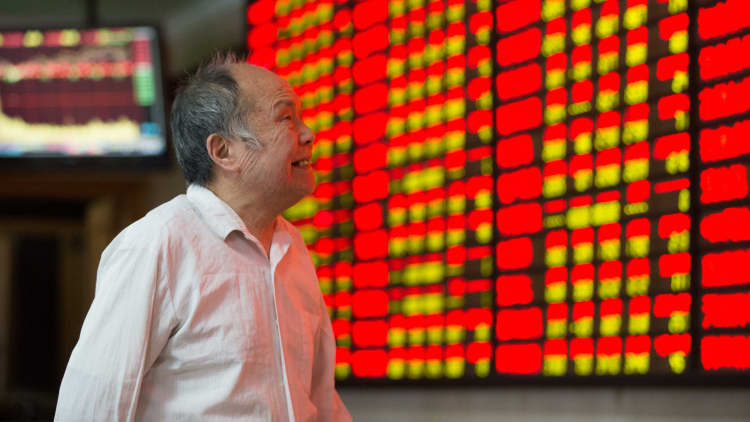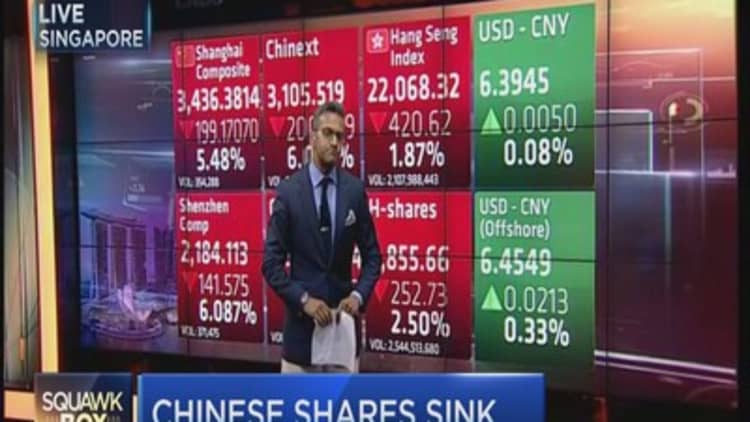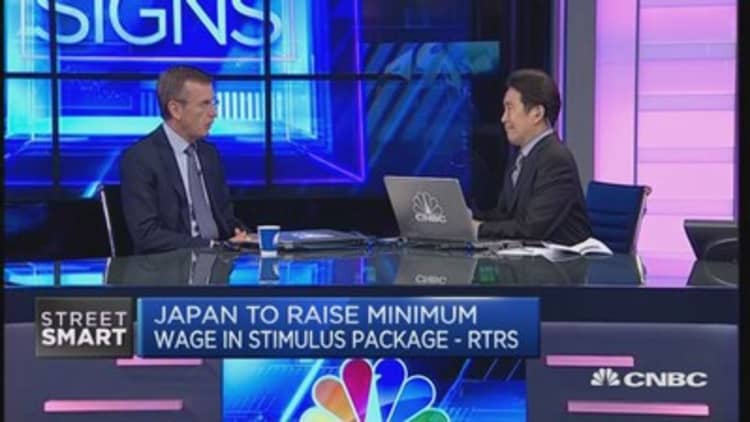


Asian stocks closed sharply in the red, led by a heavy afternoon sell off in the Chinese market as brokerages tumbled after authorities launched probes for alleged violations of trading rules.
Elsewhere, the ASX, Nikkei, and Kospi all closed in the red.
China market tanks as CSRC goes after brokerages
In China, equities saw a significant sell off as a result of investigations by the Chinese securities regulatory body into several brokerages for breaking regulations. The closed 199 points, or 5.48 percent, lower; the Shenzhen Composite closed 6.1 percent lower, the Chinext was down 6.1 percent, and the CSI300 Index saw a decline of 5.38 percent.
Chinese brokerages took major hits, with Citic Securities, Founder Securities, and China Merchants closing 10.1, 10, and 9.98 percent lower after news broke that the China Securities Regulatory Commission (CSRC) has launched investigations into these firms to weed out short selling and speculation.
Earlier in the day, Citic announced it received a formal notice from the China Securities Regulatory Commission (CSRC) that it was under investigation, along with Guosen Securities, for violating securities laws. Shares of Guosen also plunged, closing 10 percent lower in afternoon trading.
Reuters then reported that Haitong Securities, whose shares were halted from trading, was also being investigated by CSRC for alleged violation of securities regulations. Earlier in the year, the firm was fined 86 million yuan ($13.5 million) for breaching securities rules.
Other shares also closed lower on the back data that showed a 4.6 percent year-on-year slump in China's industrial profits for October, sparking fresh concerns about an economic hard landing.
"This is a long-term trend. Even though the PBOC keeps on cutting the interest rate, the RRR, it doesn't help a lot," Dickie Wong, executive director at Kingston Securities, told CNBC's "Asia Squawk Box". "The consumer habits are changing."
ING's Tim Condon said in a note, "Averting the hard landing depends on supporting manufacturing growth and banking system liquidity."
Citing Fitch Ratings, Condon added that a real estate correction could be the proximate threat to manufacturing growth, even as China continues to implement policies to revive its economy. But "the policy easing already implemented and the scope for additional easing make a soft landing the baseline scenario," Condon wrote.
Metal shares reacted negatively on the back of falling industrial profits for October. Shares of Baoshan Steel, Aluminium Corp, and Yunnan Copper slumped between 5 percent and 9.7 percent.
Airline shares also saw firm losses amid heightened global security, as well as recent news from the International Air Transport Association (IATA) suggesting that slowing growth in China, the fastest growing market for air travel, would result in a fall in global demand for air transport.
Nikkei loses steam

The failed to rally in afternoon trade, closing 60 points, or 0.3 percent, lower and moving further away from the elusive 20,000 mark that has not been hit since mid-August.
Data released Friday showed Japan's core consumer prices fell for the third straight month, underscoring the fragile nature of the economy. The core consumer price index (CPI), which excludes fresh foods, fell 0.1 percent on-year last month as a result of sliding commodity prices.
Meanwhile, Japan's unemployment rate for October fell to 3.1 percent according to government data, the lowest reading for October since 1995 as a shortage of workers led to more people finding employment. But despite having more people in the workforce, Japanese household spending fell 2.4 percent on-year in October, other data showed.
The Japanese yen traded flat against the dollar at 122.60.
Investors did not appear too concerned by the data in morning trade. Japanese blue chip companies Sony, Canon, and Toshiba all closed in the positive while Mitsubishi Electric was down.
Automakers were trading mixed, with shares of Nissan and Mitsubishi Motors closing up. Honda, Mazda, and Toyota all ended lower; earlier in the week, Toyota recalled 1.6 million cars, adding to the total of 15 million vehicles since 2013, due to faulty airbags.
Japanese airbag manufacturer Takata, which has been embroiled in a faulty airbag scandal after large number of accidents were reported worldwide in vehicles using Takata airbags inflators, pared back losses to close 0.24 percent higher.
Last month, major car manufacturers including Toyota, Honda, and Nissan announced they would no longer use Takata airbags in their new vehicles.
Airline stocks continued to be hit on the back of geopolitical tensions and security concerns. Shares of Japan Airlines closed 101 points, or 2.31 percent, lower while ANA declined 6.3 points, or 1.76 percent.
Kospi ends in negative territory
The Seoul Kospi lost its intraday gains and closed in negative territory as blue-chip stocks traded mixed.
Chipmaker SK Hynix lost its morning gains to close down 750 points, or 2.29 percent, after the company said it rejected a collaboration proposal from China's Tsinghua Unigroup. Neither company gave any details on the reported proposal.
Shares of LG Display clawed back some of the early morning gains and closed 2.19 percent higher, after the company announced it would invest more than 10 trillion won ($8.71 billion) to build a plant that will make organic light-emitting diode (OLED) panels for TVs and smartwatches to compete in the ultra-clear display technology space. Reports said production was expected to begin in the first half of 2018.
ASX fails to rally
Australian's ASX 200 closed 8 points, or 0.16 percent, lower at 5,203 as banks and resources producers saw much of their early gains trimmed.
Shares of Rio Tinto could not carry on positive momentum from morning trade, closing 0.26 points, or 0.56 percent, lower.
The company won final approval to expand its Warkworth coal mine in New South Wales, despite protests from environmental groups. Reports said Rio Tinto could now look for potential buyers for the mine as it aims to reduce its coal business following a slump in global coal prices.
Fortescue Metals, BHP Billiton, and Mount Gibson also closed in the red while Atlas Iron and BC Iron remained unchanged. South32 and gold miner Newcrest, however, maintained their positive run throughout the trading day, up 2.08 and 0.8 percent respectively.
NAB shares lost all of its morning gains to close flat, following the announcement on Thursday that the bank planned to exit the U.K. market early next month by spinning off its British business unit, CYBG. Reports said NAB would spin off about 75 percent of its Clydesdale and Yorkshire banks to its shareholders and sell the rest to institutional investors through an initial public offering early next year.
Shares of Qantas closed higher after the Australian Competition and Consumer Commission reauthorized the Qantas-American Airlines alliance, under which airlines will coordinate their operations on trans-Pacific routes for a further five years. Shares in other major airlines in the region, such as Virgin Australia and Air New Zealand, were also up.
Oil producers traded mixed, following a drop in oil prices in Asian trade. Woodside Petroleum closed in the green, Santos was unchanged and Oil Search ended lower after spending the whole trading day in negative territory.
Oil prices, which were pushed up as a result of the Russia-Turkey jet incident, fell on Friday. Internationally traded Brent was down 7 cents at $45.39 a barrel. The West Texas Intermediate (WTI), which is the U.S. crude benchmark, was down 52 cents at $42.52 per barrel overnight.


